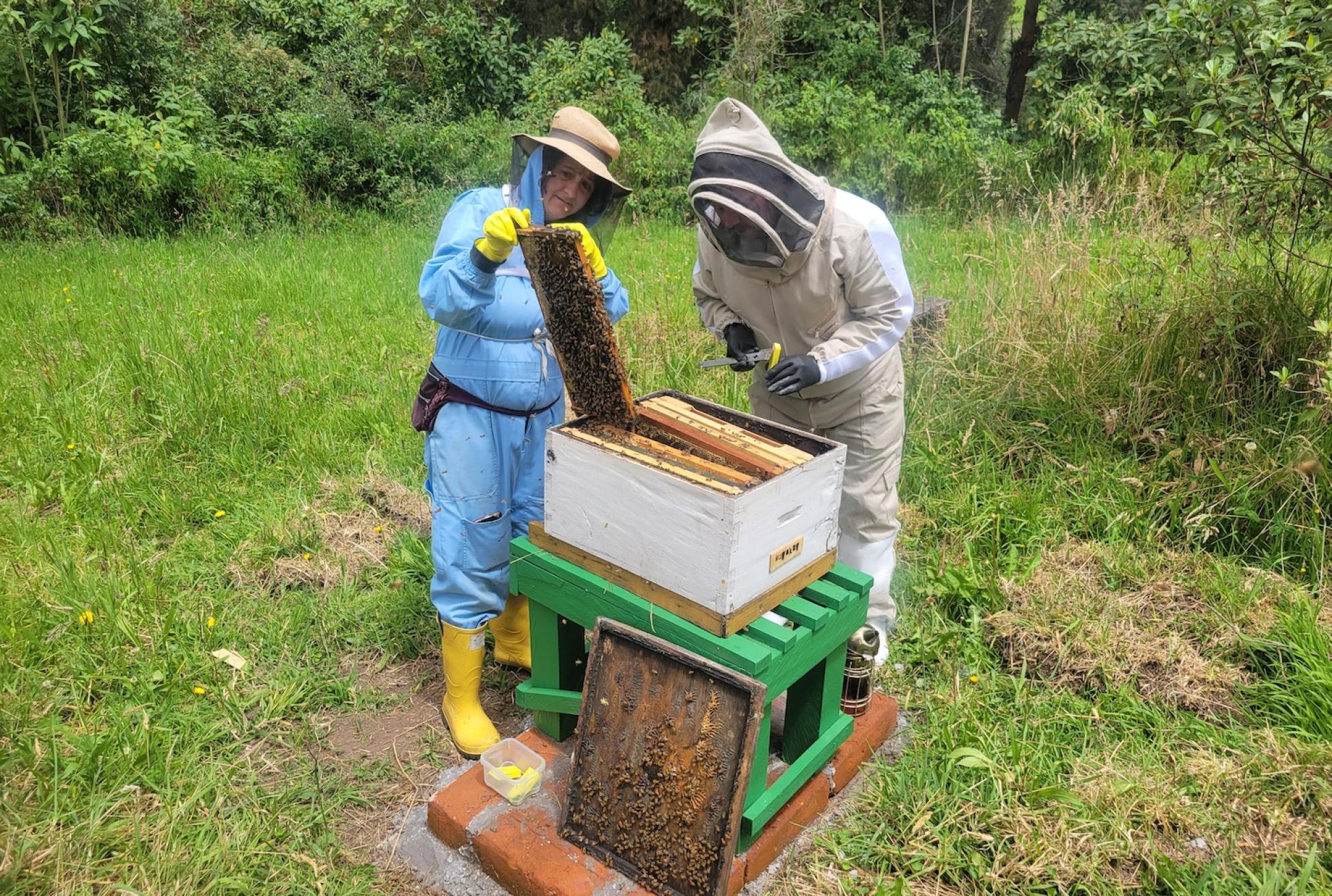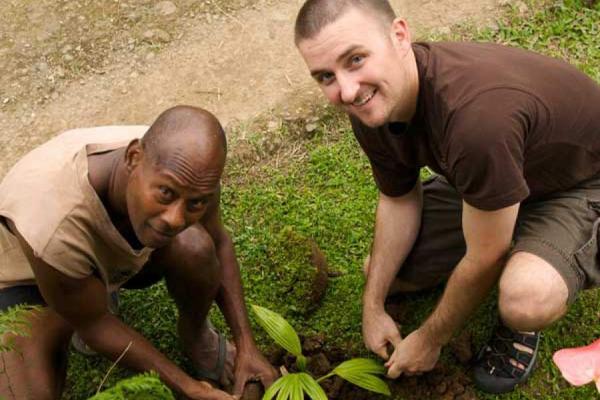Volunteering overseas can be a great opportunity for self-discovery, skill-building, and new relationships. The Internet is flooded with countless examples of young travellers hopping on airplanes to teach English in Thailand or live on an animal sanctuary in Kenya. This became all the clearer to me as I scrolled through the hundreds of options for volunteering overseas on my computer.
I had decided that I wanted to do something that would place me deep in nature, so farm work seemed like a safe bet. A farm in the jungle of northern Ecuador caught my attention as a surefire way to learn new skills off the grid and experience South America at the same time.
I sent in my application.
Unfortunately, the farm in the north was a no-go, but there was an option high up in the Andes. A bee farm located about an hour south of Quito needed volunteers. With nothing to lose, I signed myself up as a helping hand on an Ecuadorian apiary.
If only I had known how many times my “helping hands” would be stung.
A busy worker bee.
When I arrived at the farm—located in a stretch of Ecuador known as “the Avenue of Volcanoes”—I felt like I was walking into a Laura Ingalls Wilder novel. The small cabin where I would be staying had a massive fireplace, roosters called out the arrival of the sun every morning and, of course, bees were buzzing all about.
My first few days consisted of getting a lay of the land and to know the amazing family who I would be spending my time with on the ranch: Gabby and David, the couple who ran the apiary, were some of the kindest people I had ever met and knew how to make a mean Ecuadorian breakfast. Gabby’s father, Pepe, a former pilot, was full of jokes and information. Any plant Pepe saw—from those that could make you hallucinate while killing you at the same time, to those that could cure skin ailments—he knew exactly what it was.
If only I had known how many times my “helping hands” would be stung.
Gabby and David’s two daughters were excited to learn English as much as I was excited to learn Spanish, so we spent plenty of afternoons exchanging words. (I can say for a fact that they taught me far more Spanish than I taught them English.)
After a few days of assisting with household tasks, Gabby told me that I was finally ready to work with the bees. For Gabby and many others who work in the beekeeping business, apiary work is as spiritual as it is physical. Gabby referred to the apiary as a temple and believed firmly that bees reacted to the energy of those around them. She claimed that one could know exactly how bees would behave based on the sun and used a small rock pendant to decide where certain things in the apiary should be done. In other words, if I was going to work with the bees, my energy was going to have to be on point.
For my first day of bee work, Gabby and I drove to a nearby town to meet a friend of hers and fellow beekeeper named Sebastian, whose apiary is located near the top of a mountain. As we made our way up the winding roads, views of farmers tending hillside fields spread out below us.
It was on Sebastian’s farm that the real adventure began.
The first step in the lengthy process of apiary work preparation was putting on the suit and veil. The mesh net was placed over my head and ties across my chest. The large blue suit made me feel as if I had just stepped into an episode of Breaking Bad. The similarities between meth cooking and Ecuadorian beekeeping stopped there. One of the most crucial parts of beekeeping is using the bee smoker. The bee smoker can quite literally be the difference between a welt-covered and not-welt-covered hand as it calms the swarms with each puff.
After the three of us were suited up and the bee-smoker was puffing away. Gabby’s spiritual philosophy around beekeeping once again came into play. Meditation, according to Gabby, was the most important part of the preparation phase as bees are highly susceptible to the energy of those around them. After about 10 minutes, Gabby decided that I had reached a state of apiary enlightenment sufficient to begin my career as a beekeeper. I was told to stay at a safe distance, but I had other ideas. If I was going to be beekeeping, I was sure as hell going to get the full experience.
Gabby had asked if I would be willing to record various beekeeping tasks with my GoPro. The first few hives seemed quite calm so with bee-smoker in one hand and my GoPro in the other, I got my first experience of the apiary world. It is hard to describe beekeeping to someone who’s never experienced it before. The buzzing of the swarms can be absolutely deafening and the sheer number of bees that you can find stuck to your veil, roughly two inches from your face, is astounding. After about two or three calm hives, I decided that maybe I was getting the hang of this whole thing. At that moment, Gabby announced that it was time to tackle the bad boys.
One of Sebastian’s hives had a particular reputation for being nasty. Gabby once again warned me to stay back—but up-close GoPro footage seemed more important at that moment than potential death by bee swarm. The moment that Sebastian opened the lid on the hive, the party began. The first sting got me in the arm straight through the veil. A burning sensation lit up the spot for about 30 seconds but seemed to dissipate. The question of whether I was allergic to bees seemed to be answered.
The noise of the buzzing was far more intense than the other hives and my veil and gloves were literally covered in a thick blanket of Ecuadorian honeybees. I felt a strange tingling sensation in my glove and simply took it off without even thinking. Bad call.
The next few minutes are hard to describe. What had once been my left hand felt more like a throbbing stump that had just been dipped in a pot of magma. Every nerve in my hand seemed to light up like a Christmas tree, as bee sting after bee sting bit into my unprotected hand. Sebastian frantically pumped smoke on my hand as I ran away from the hive. It is truly amazing how far bees are willing to follow someone once they have locked onto a target. After running a good few hundred yards away and being stung just a couple more times for good measure, the bees finally ceased their siege of my hand.
Gabby informed me that I was done beekeeping for the day. Perhaps I had not meditated hard enough or maybe the bees were just not “diggin’ my vibes,” as the kids like to say these days. Regardless, I felt like I had finally been initiated into the ranks of South American beekeeping. I certainly had enough GoPro footage and welts to prove it.
Baptism by bee sting.
My baptism by fire, or bee sting, at Sebastian’s apiary helped prepare me for the following days back on Gabby’s farm. Overtime, I became much more comfortable working the bees, trusting my instincts, and of course, Gabby’s pre-beekeeping meditation rituals. I managed to work my way to the point where with some of the less aggressive hives, I could work gloveless. The stings continued to come but in far less painful bursts than the initial onslaught I suffered at Sebastian’s farm.
Simply staring at the natural beauty of the surrounding area was enough to kill the time. In between farm chores I would go for walks through the nearby forests and fields. Horses resting under shady Eucalyptus trees, local farmers tending their crops, and tractors driving down the bumpy, dirt roads were sights that greeted me every day. One of my favourite memories from my time on the farm had nothing to do with beekeeping at all. I had decided to walk to the nearest store, about 30 minutes away, to grab some provisions. On my way back, a downpour typical of rainy season in the Andes struck. Walking down the dirt road, surrounded by tall trees and farmland, as the rain poured down on me was a surreal feeling that I will never forget as long as I live.
When my time on the farm came to end, I found myself a changed person. I would never have figured a year ago that my future held beekeeping and tree farming in the mountains of Ecuador. If anything, my experience on the farm in Ecuador blessed with me a sense of confidence and a knowledge that I was indeed not allergic to bees.
Add this article to your reading list




